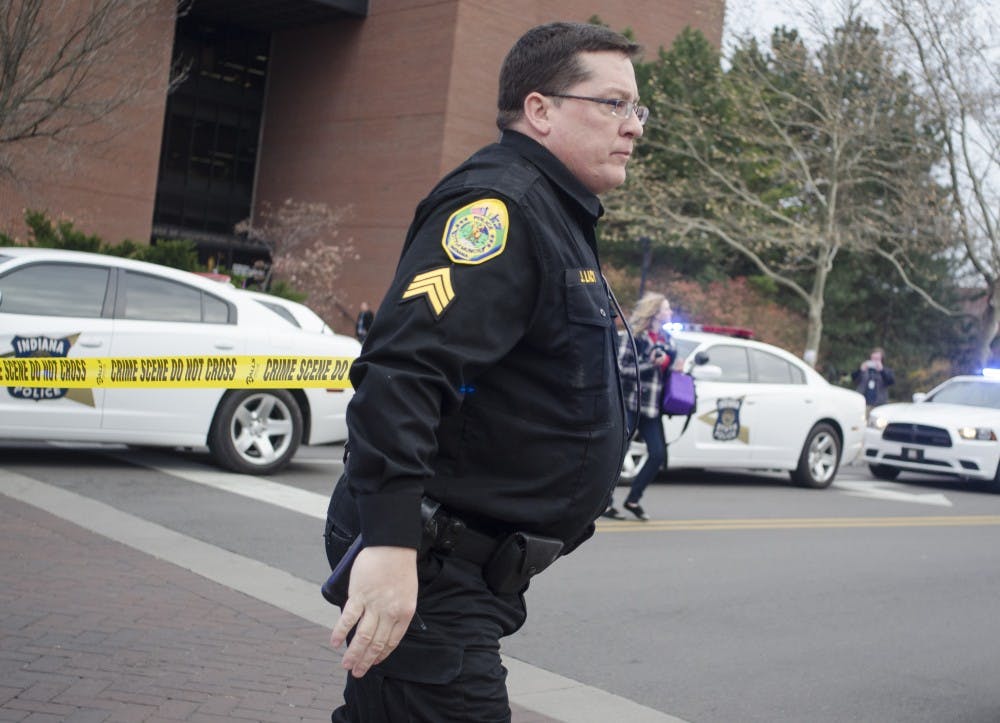Editor's note: This is the second part in a two-part series on pay and training differences with Muncie and university police.
University police officers are often paid more than their city counterparts, despite having a smaller area to patrol.
Ball State UPD officers are no exception, averaging higher salaries than those working for the Muncie Police Department, in addition to the extra training they receive.
In the first part of the series, read about the differences in training between the departments.
Between Muncie and Ball State police departments, pay wages vary amongst positions and levels of leadership. While Lt. David Bell of Ball State’s University Police Department said there are many new recruits coming into UPD, other officers have been with the force for more than two decades.
Ball State University police officers make a base pay of $18 per hour, but the average annual salary for current full-time UPD officers is approximately $50,000, according to the Board of Trustees annual salary report.
As of 2015, a full-time officer with MPD receives a base pay of $42,810 per year, with a patrol officer making an average of $42,930 in a calendar year, according to City of Muncie annual salary records.
As for the chiefs of police, city records indicate MPD Chief Steve Stewart’s salary is just over $60,000 per year, while UPD’s Director of Public Safety James Duckham made more than $111,000 during the 2014-2015 school year, Ball State Trustee reports said.
Duckham said more experience and time with the department typically equates to higher leadership and higher salaries.
Ball State administration and the Board of Trustees determine salaries and wages for Ball State university police, and funding can vary each year, said university spokesperson Joan Todd. Over the last five years, wages have continued to rise for university officers and UPD administration.
For Muncie police officers, the City of Muncie instead determines funding, with the City Council and the Fraternal Order of Police deciding annually what changes can be made to department funds and salaries.
“We’re thankful for what we have, but we could greatly benefit from more,” Stewart said. “Money is tough to come by for many departments — not just this one — but I could use more resources for my officers and for this department.”
Since Stewart took the position as chief of police in Muncie, the department has seen one raise.
“It wasn’t a lot, but it was something,” Stewart said. “I would love to see another raise come through here.”
Most MPD officers and employees have more than 20 years of service with the department already, but Stewart said those members can’t expect much more of a guaranteed raise.
“I want to raise the wages, I want to get five or six more officers out there and I want to give those in this department more of what they really deserve,” Stewart said.
Stewart said more than half of his officers hold a second job elsewhere. Many find part-time work serving as school security guards or traffic patrol, and some are working in “completely different areas” altogether.
“[The officers] love what they do — I know it, I see it every day — and I know the community is always becoming a better place when they’re out there,” Stewart said. “It’s not cutting it for most of these men and women, though. There’s just not enough income for an officer to only be employed by the department.”
Bigger Picture
The Department of Justice suggests that, on average, university-employed police tend to earn salaries above those of city or state law enforcement officers. While this is true for Muncie police when compared to its campus counterpart, other college towns in Indiana are not seeing the same trend.
Indiana University Bloomington police officers make an annual base pay of $40,726, and similar to Ball State’s university police, IUPD pay wages increase with time and leadership level. However, probationary officers for the Bloomington city police force receive $45,544 per year.
While IUPD averages 10 to 12 calls per day, according to the iu.edu daily crime log, most calls the department receives involve alcohol violations, marijuana or other misdemeanors. Bloomington police are responding to similar calls, although police logs indicate the department oversees more cases that involve violence and serious injury or death.
IUPD employs 125 full-time sworn police officers — 44 of which are exclusively employed at the IU Bloomington campus — and is among the 12 largest law enforcement organizations in Indiana.
Lt. Craig Munroe, public information officer for IUPD, said officers at IU Bloomington still typically clock three to four times more training than is required by the state.
“The training division's primary responsibility is to provide training opportunities to the officers of the department throughout the year,” Munroe said. “It is not unusual for the training division to coordinate and/or provide over 15,000 hours of training a year for the departmental personnel.”
Moving Forward
UPD officers average more pay in a calendar year than officers with the city police, but Bell said Ball State officers are also averaging three times as much in-service training than their local counterparts.
Although it’s unknown if or when either MPD or UPD officers will receive a pay raise, employee performance and pay are assessed at the end of each calendar year by the City of Muncie and by the Ball State Board of Trustees, respectively.
Stewart said he didn’t disagree that there are gaps in pay, but he argued that his officers are ready for the “high-intensity” calls they frequently receive on a typical day.
“I wish there was higher pay for [the officers],” Stewart said. “But I don’t doubt the performance of the men and the women in this department - the community is safer with these dedicated individuals, and I know many are grateful for that.”





